Newsletter
Only good movies
Get the Indie Focus newsletter, Mark Olsen's weekly guide to the world of cinema.
You may occasionally receive promotional content from the Los Angeles Times.
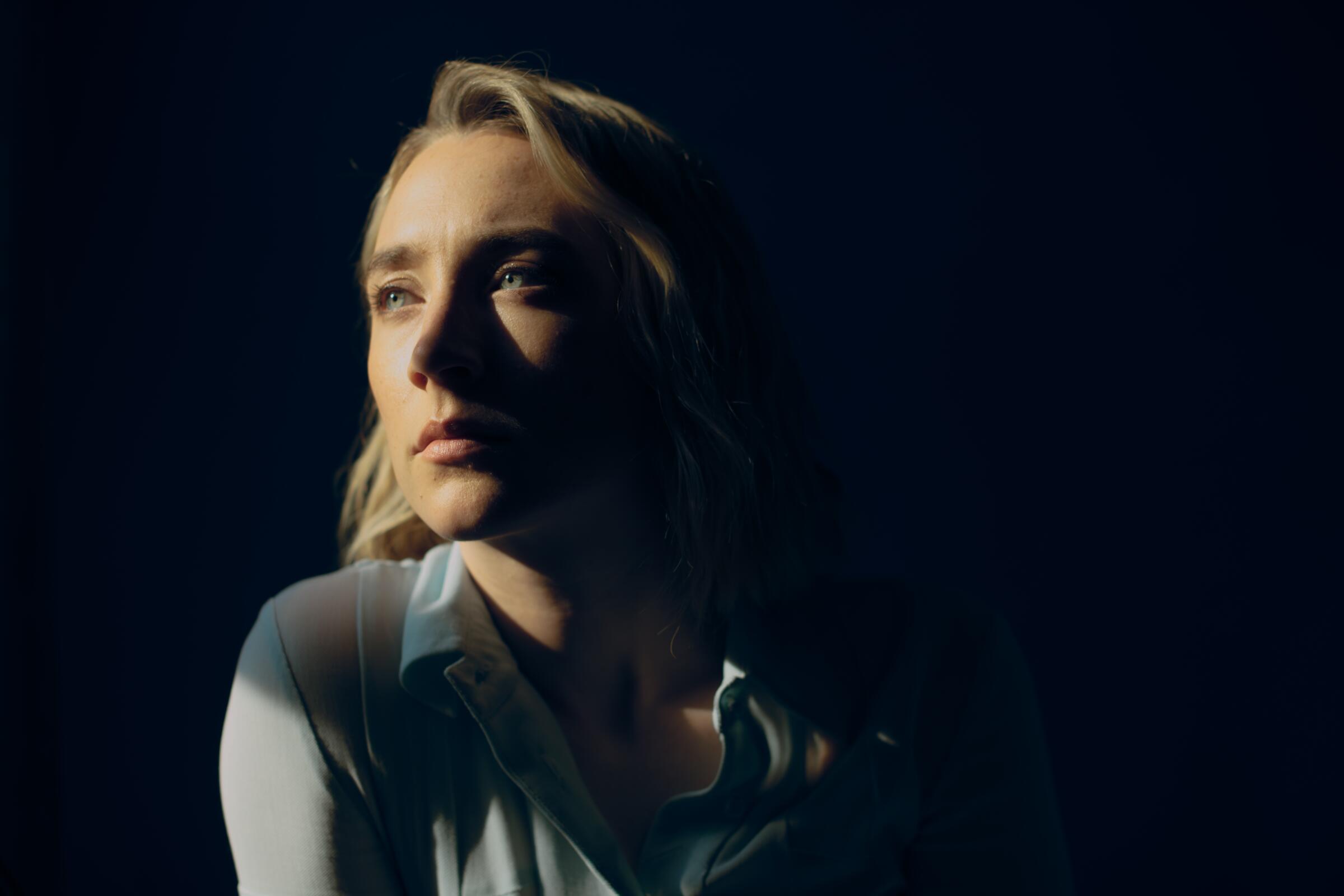
There’s a piece of advice that has always stuck in Saoirse Ronan’s head. When she was 12, the Irish actor was cast in “Death Defying Acts” opposite Guy Pearce and Catherine Zeta-Jones. She’d just earned an Academy Award nomination (her first of four to date) for “Atonement,” but still, Ronan was anxious because her character didn’t have much dialogue.
“I said to my mom, ‘How am I going to do my job if I’ve got no lines?’ ” Ronan says. “And she said to me, ‘Always remember that you can tell a story with your face and eyes as much as you can with words.’ ”
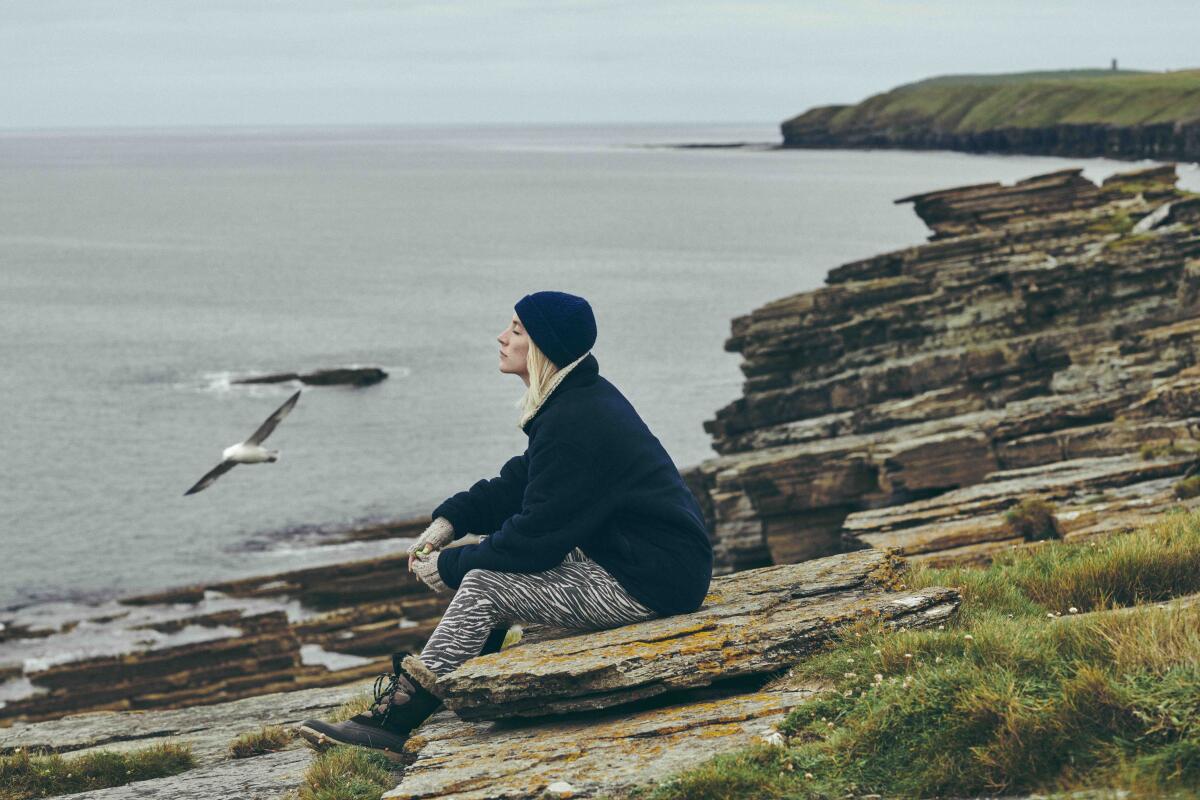
Years later, in “The Outrun,” a lyrical adaptation of Amy Liptrot’s brutally honest 2016 addiction memoir, Ronan not only embraces that advice but embodies it completely. Her turn as Rona, a dramatized version of Liptrot, is a master class in telling a story with every single tool in an actor’s arsenal. Playing an alcoholic who travels to the remote Scottish islands of Orkney during her recovery, Ronan cycles through difficult emotions — grief, rage, humiliation, joy, wonderment — often appearing in scenes alone and unfurling the story with her face and eyes as much as with the voiceover narration. It’s an undeniable, soul-shaking performance that could finally take Ronan all the way to the Oscars stage.
Today, Ronan is sitting at the dining room table at her home in London, which she shares with her husband, the “Slow Horses” star Jack Lowden, whom she married earlier this year, and their adorably floppy-haired dog, Stella. The rooms are filled with books of every variety, and maps of Scotland decorate many of the walls thanks to Lowden’s heritage. Speaking with Ronan, 30, who casually sits drinking tea in a “Friends” T-shirt and jeans, is like catching up with an old pal. It’s no surprise that directors describe her as professional and easygoing, traits she’s picked up working on film sets since childhood.
“It’s a craft for me,” Ronan says of her process. “I’m not a Method actor in any shape or form. I enjoy the technical side of being able to switch from me into that. It helps me to retain who I am. It’s like when you go into the office in the morning and turn on the computer, or pick up your instrument and start playing. I wish more actors would dispel that myth. I’m not in it all the time.”
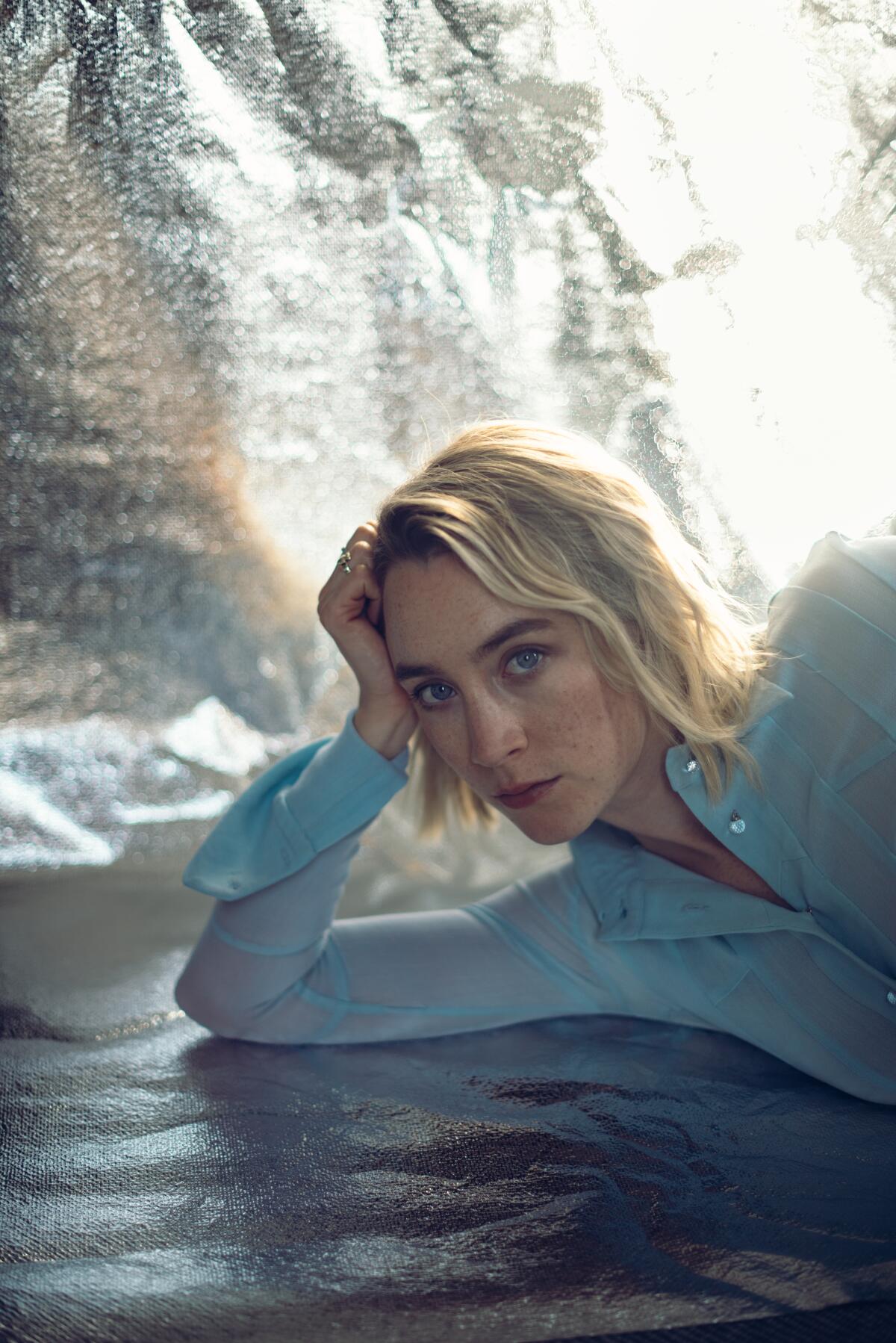
“The Outrun” (in theaters Oct. 4) marks Ronan’s first time as a producer, although she’s curious about writing and directing and has recently been toying with an idea for a short. She discovered Liptrot’s memoir thanks to Lowden, a keen reader who Ronan says often seeks out books connected to the places he visits. “The Outrun” sat on his bookshelf until the pandemic lockdown, when he devoured it in two days. He immediately handed it to Ronan and said, “This is what you should do next.”
She read it just as quickly, discovering a personal tether to the story. Ronan says she has watched people close to her struggle with alcoholism. She describes it as “something that has played a huge part in my life, battling for the love and the attention of someone and them not being able to choose me over this substance.” But it’s never been a subject she’s felt ready to explore onscreen until now.
“I found it really evocative and very emotional without being indulgent,” Ronan says of Liptrot’s unflinching book, highly regarded by those in recovery. “And there’s a uniqueness in watching a young woman onscreen struggle with alcohol addiction.”
Ronan and Lowden teamed up with producers Dominic Norris and Sarah Brocklehurst, who had previously optioned the memoir, and spent the next two years of the pandemic trying to convince studios to finance it. (“A lot of people basically felt it wasn’t commercial enough,” Ronan says.) Eventually, they hired German screenwriter and director Nora Fingscheidt, who became an indelible creative partner, even if at first she thought the book was “unadaptable.”
“I had no idea how to structure this into a movie,” Fingscheidt says via Zoom. “Half of the film is this woman by herself on a tiny, remote island and it could easily become boring. But because [Saoirse] is one of the few actors who has the ability to hold that space, it gave me confidence that, actually, yes, this can work.”
Fingscheidt compressed the nonlinear narrative into three interconnected parts: Rona’s time on Orkney, her past wild days in London and what the filmmaker calls the “nerd layer,” where Rona narrates facts about Orkney, science and Scottish folklore. Because English is a second language for Fingscheidt, she wrote the script loosely, without specific dialogue, leaving it up to the actors to know what to say.
“It was a bit unusual for me to work like that,” says Ronan, who wrote many of Rona’s lines herself. “But because I would love to make my own stuff, it gave me a bit more confidence to know that when it came to that stage of developing a film I wasn’t completely clueless. I could find a way to use my own voice and translate that into dialogue.”
“The Outrun” was shot in 2022 in London and the Orkney Islands, including the remote community of Papay, where Rona isolates herself in a cottage in the middle of winter. Ronan prepared with choreographer Wayne McGregor and listened to several podcasts about addiction, including “Hooked” by Melissa Rice. She also went with a friend to an AA meeting, which she admits to feeling nervous about attending.
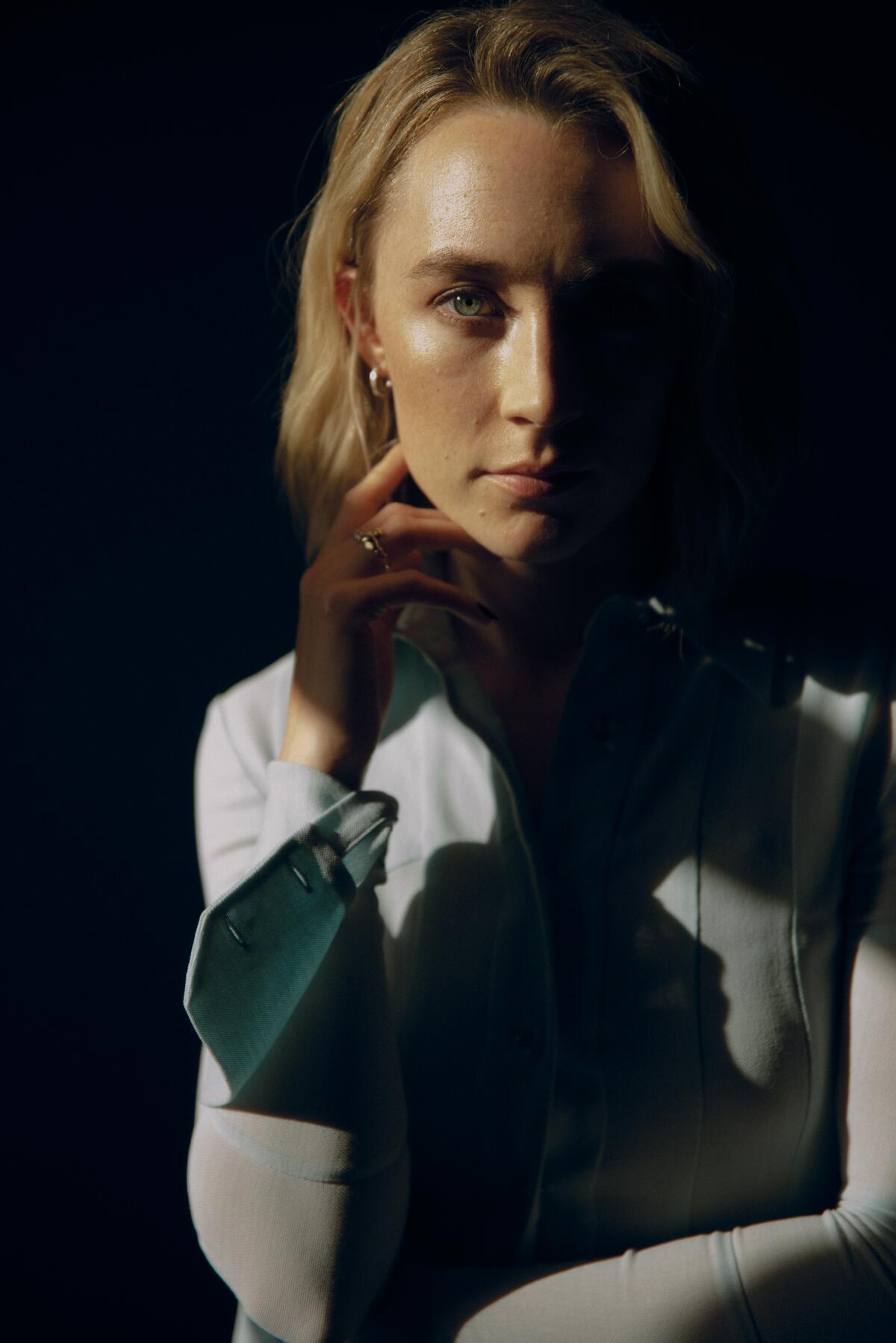
“I felt bad for being there,” Ronan recalls. “It was hard to hear it from their side, having been on the other. It doesn’t take away the resentment and the anger and the confusion and the sadness, but I’m glad I did it.”
In the film, Rona is often inebriated and completely unaware of how her constant drinking impacts those around her. These include her boyfriend, Daynin (Paapa Essiedu), and her mother (Saskia Reeves), who herself has had to manage the mental illness of Rona’s father (Stephen Dillane). To play drunk, Ronan drew on another piece of advice she received, from Greta Gerwig during “Lady Bird.”
“I remember Greta saying, ‘Remember that when people are drunk, the last thing they want is for people to think that they’re drunk, so they try as hard as they can to be sober and they do that by over-enunciating,’ ” says Ronan. “When it came to doing ‘The Outrun,’ my first thought was: I have to get the drunk right. I need to find variation in it. I need to find the heaviness of that.”
She also looked to Stephan Graham’s performance in the 2019 British miniseries “The Virtues,” which Ronan calls “the most honest portrayal I have seen of a drunk and that spiral that happens.”
Ronan’s performance passed muster with perhaps the most important person, Liptrot herself. “When I watch Saoirse, I do feel like she’s got a lot of me in her,” the author says, via Zoom. “Even back when we were doing a read-through, I could tell that she got the subtlety of the lines and the different meanings. And what she can do with her face! For her to return again and again to what are quite emotional moments was just incredibly impressive in terms of her stamina and commitment.”
Many of the people who have worked with Ronan echo that level of commitment. It’s part of what has allowed her to transcend being a child actor, first in films like “Atonement” and “The Lovely Bones,” then building an impressive career in everything from Gerwig’s “Little Women” to Francis Lee’s “Ammonite” and Steve McQueen’s forthcoming WWII drama “Blitz.”
Ronan traces the pivot point to “Brooklyn,” the moving 2015 immigration drama that she filmed with director John Crowley at age 19 shortly after moving from Ireland to London.
“I wanted to leave home but I was very homesick,” Ronan remembers. “I found it really hard, but I didn’t want to go back — it was literally ‘Brooklyn.’ I hadn’t had anyone push me in the way [John] did before. He treated me like an adult actor and that took me a minute and left me with a bit of a bruise.”
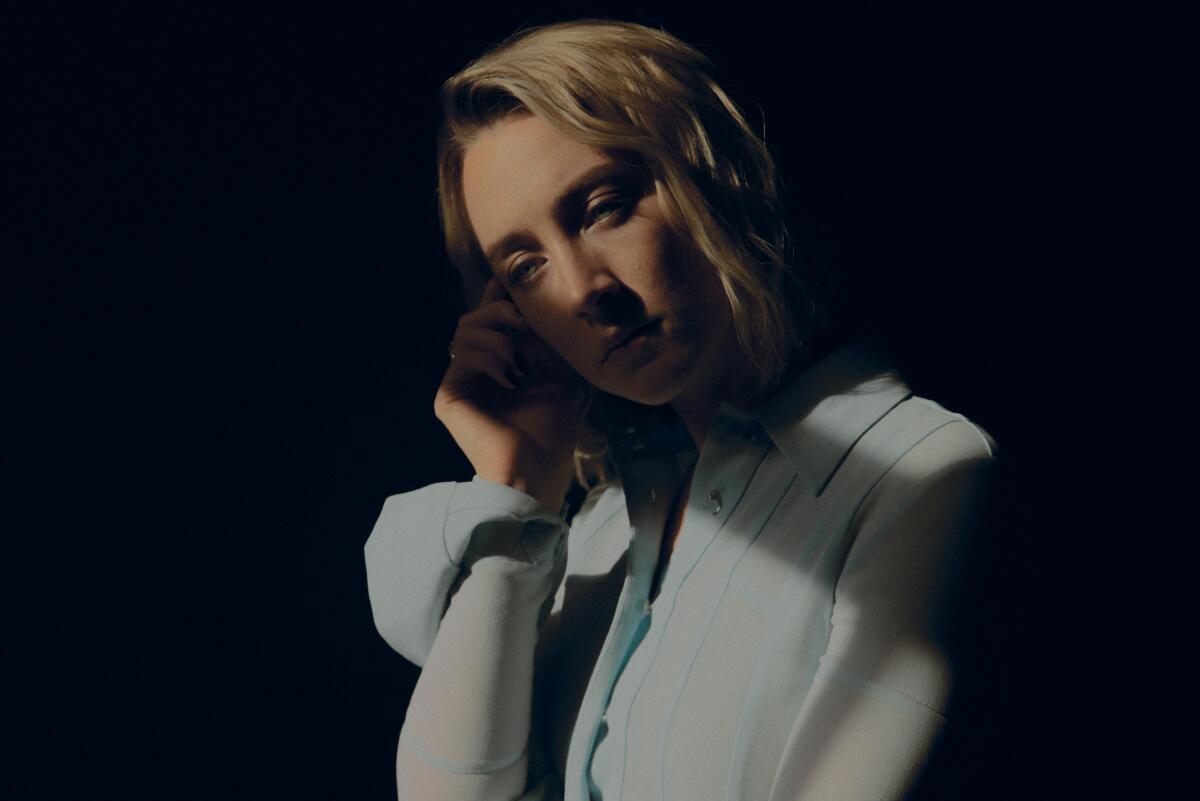
The process resulted in another Oscar nomination for Ronan, which Crowley credits to the “level of emotional vulnerability available to Saoirse on set daily.”
“It was like watching somebody going out on a tightrope,” the director recalls. “And she made it look easy. Of course, it’s not easy. It cost her. But I think she felt that she was truthfully expressing something of herself in the role and that’s why it yielded so beautifully in her hands.”
Like Liptrot, Crowley mentions Ronan’s ability to telegraph a scene without words. “She could have had a great career in silent movies,” Crowley says. “She just has an ability to express emotion, if you turn the sound down, in a way that is magical to me still.”
A gifted cinematic presence since her Oscar-nominated “Atonement” debut at age 12, Saoirse Ronan has played everything from a young assassin raised among wolves in “Hanna” to a resident of “Grand Budapest Hotel’s” imaginary Zubrowka.
That talent is on display in McQueen’s “Blitz” (in theaters Nov. 1, then on Apple TV+ Nov. 22), in which Ronan plays a single mother, Rita, struggling to keep her mixed-race son safe during the German air raids on a besieged London. She had wanted to work with McQueen for a while and the opportunity arrived right as Ronan was scheduled to take a break after shooting “The Outrun.” Initially, Ronan wasn’t convinced that “another World War II movie” would be interesting.
“They’re great, but I don’t need to see any more personally,” she says. “I was so relieved when Steve told me that it was going to focus on a mother-son relationship, and that he’d follow the people back at home and the people on the ground who had been overlooked and weren’t really written about in history books as much. And what an interesting perspective.”
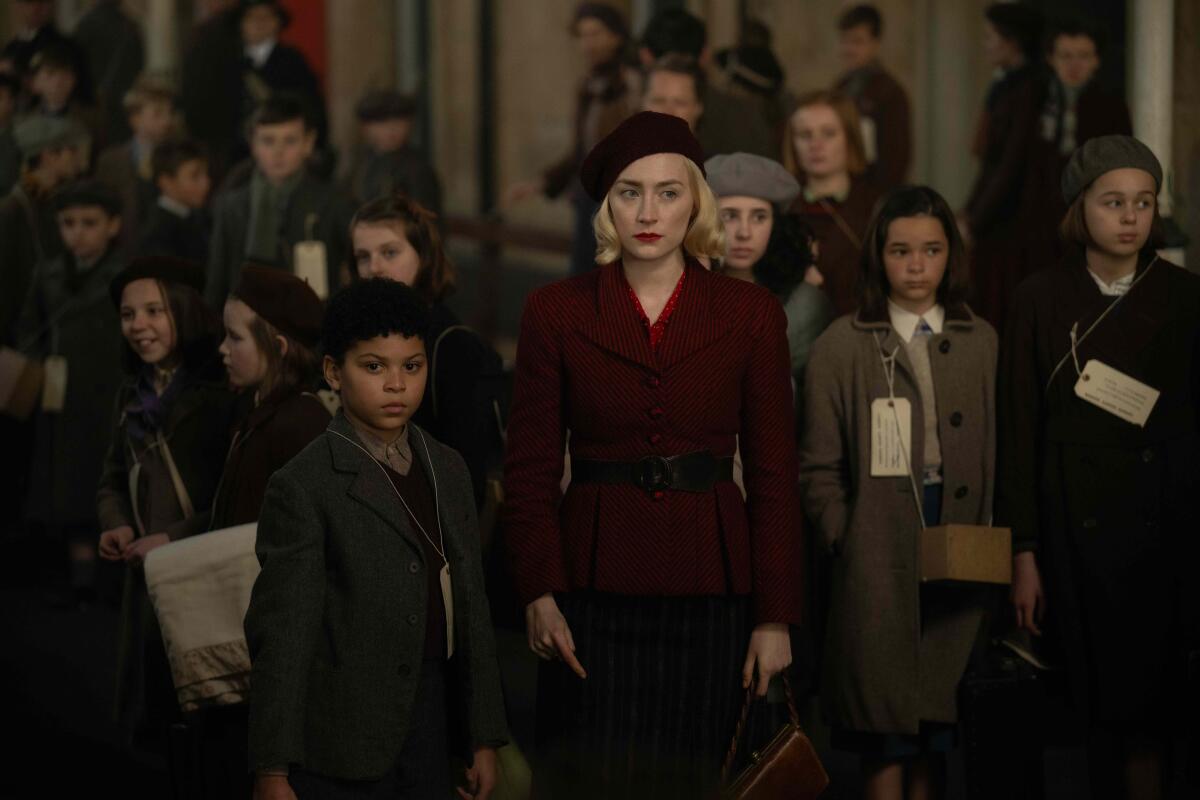
Rita’s emotional journey is less broad than that of Rona, but it’s imbued with a similar depth of feeling. In “Blitz,” Ronan exercises a new muscle, her singing voice, and steps even further into adulthood as she portrays a mother. “To be able to show this other side of what was happening in the war and how it affected mixed-race couples and mixed-race children — and children in general and women — was so fascinating,” she says. (She will veer again, in a comedy called “Bad Apples,” about a teacher who accidentally kidnaps one of her students.)
“I would like to do something big and shiny,” Ronan says of the future. Her dream role: a Bond villain. (“I’d love to do that,” she says in earnest, without a hint of camp.)
“I’ve done a lot of independent film,” she says. “And I love the experience of making an independent film. I love the atmosphere on those sets.”
“The Outrun” feels like the apotheosis of that phase of her run, a movie that offers an intimate sense of catharsis, particularly for those who have been affected by addiction. Despite its difficult subject matter, it ultimately becomes a film about hope.
“The most common story with addicts is not one of recovery,” Liptrot says. “It’s quite a rare thing to get sober and stay sober, but it is possible. And it can be wonderful and beautiful.”
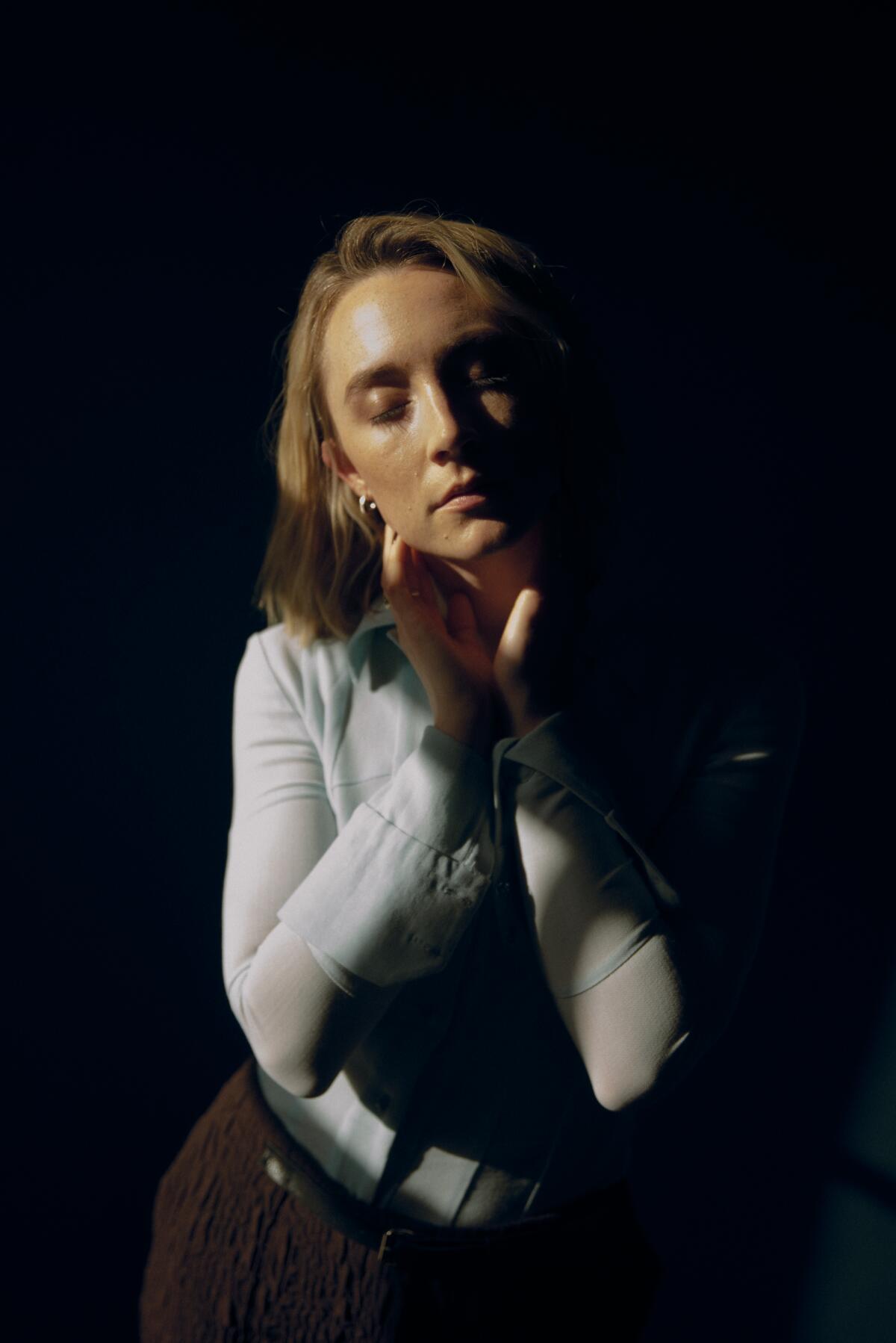
Still, sobriety is a day-by-day proposition, as Ronan now understands more completely.
“Life is full of highs and lows and a lot of trudging forward in between,” she says. “If you can just hold out for those brief moments of joy and light and life it makes it worth it and it helps you carry on. You see Rona experience every facet of it, so it feels like a celebration of life, warts and all.”
On that journey, where is Ronan herself now?
“I’m fundamentally up,” she affirms, a statement that could apply to many things in her life, from her recent marriage to Lowden to a potential dual Oscar run. She punctuates our interview, which concludes with a sincerely offered hug, perfectly. “I’m feeling very lucky with what I have and who I have and what I get to do.”
Only good movies
Get the Indie Focus newsletter, Mark Olsen's weekly guide to the world of cinema.
You may occasionally receive promotional content from the Los Angeles Times.